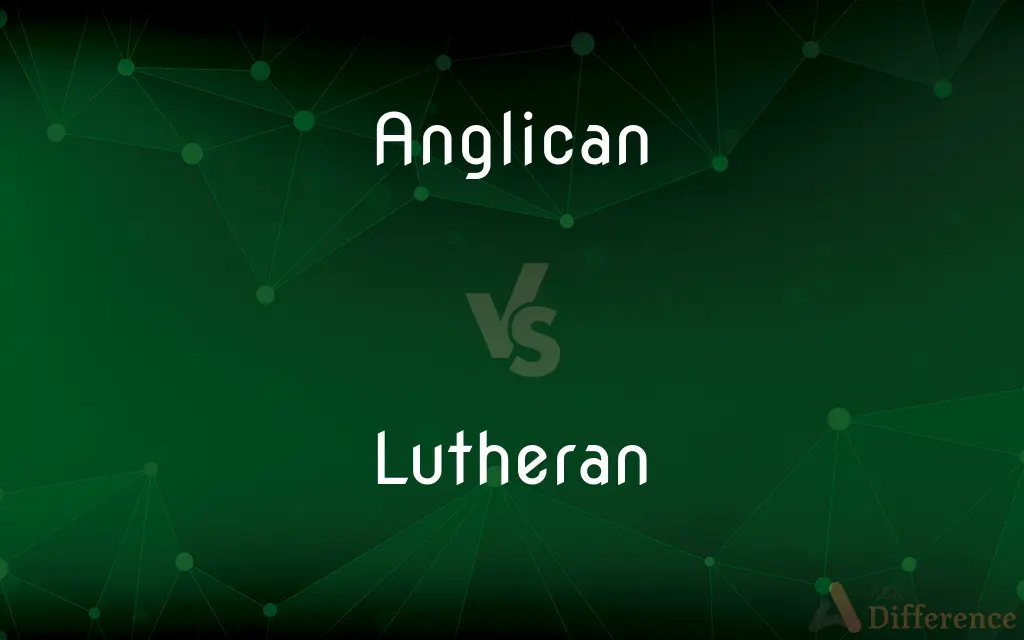Anglican vs. Lutheran — What's the Difference?
By Tayyaba Rehman & Maham Liaqat — Updated on March 24, 2024
Anglicanism emphasizes a middle way between Catholicism and Protestantism, while Lutheranism is a major branch of Protestantism focusing on the teachings of Martin Luther.

Difference Between Anglican and Lutheran
Table of Contents
ADVERTISEMENT
Key Differences
Anglicanism originates from the English Reformation, seeking a middle path between Protestantism and Roman Catholicism, emphasizing both scripture and tradition. On the other hand, Lutheranism arose from the teachings of Martin Luther, emphasizing justification by faith alone and the authority of scripture over church traditions.
Anglicanism employs the Book of Common Prayer for its liturgies, a text that has evolved over time but remains central to Anglican worship and identity. Lutheranism, whereas, utilizes the Augsburg Confession and Luther's Small Catechism as foundational texts, guiding its doctrines, worship practices, and community life.
In Anglicanism, the concept of the "via media" or middle way is essential, reflecting an attempt to harmonize Protestant and Catholic elements within its faith and practice. Lutheranism’s identity is closely tied to the principle of "sola scriptura," or scripture alone, which asserts the Bible as the ultimate authority in matters of faith and practice.
Comparison Chart
Origin
English Reformation, 16th century
German Reformation, early 16th century
Authority
Scripture, tradition, and reason
Scripture alone (Sola Scriptura)
ADVERTISEMENT
Key Texts
Book of Common Prayer
Augsburg Confession, Luther's Small Catechism
Sacraments
Recognizes seven sacraments, emphasis varies
Primarily focuses on Baptism and Eucharist
Theological Emphasis
Via media, a middle way between Protestant and Catholic
Justification by faith, authority of scripture
Worship Style
Broad range, from high (catholic) to low (evangelical)
Generally uniform, with emphasis on preaching
Governance
Episcopal, with bishops
Synodical, with regional and national synods
View of Mary and Saints
Honored, with some variance
Respected but not central to worship or theology
Liturgical Calendar
Follows, with saints' days and seasons
Follows, with less emphasis on saints' days
Compare with Definitions
Anglican
Pertaining to the Anglican Church or its members.
The Anglican tradition includes both catholic and reformed elements in its practices.
Lutheran
A member of a Protestant church that follows the teachings of Martin Luther.
Lutherans commemorate Reformation Day to honor Martin Luther’s contributions.
Anglican
The Anglican Communion is a worldwide family of churches with historical connections to the Church of England.
The Archbishop of Canterbury is a spiritual leader within the Anglican Communion.
Lutheran
Luther's Small Catechism is a key document in Lutheran education.
Lutherans study the Small Catechism to learn the basics of their faith.
Anglican
A member of the Church of England or one of the churches related to it in the Anglican Communion.
She has been an Anglican since birth, attending the local parish church.
Lutheran
Lutheranism is characterized by its emphasis on the scriptures and the doctrines of justification by faith.
Lutheranism spread rapidly across Northern Europe during the 16th century.
Anglican
Anglicanism refers to the faith, practice, and church order of the Anglican Church.
Anglicanism seeks a middle way between Roman Catholicism and Protestant reformations.
Lutheran
Relating to Lutheranism or its adherents.
The Lutheran confession emphasizes justification by faith alone.
Anglican
An Anglican service typically includes readings from Scripture, prayers, and the Eucharist.
The Book of Common Prayer guides the liturgy in Anglican services.
Lutheran
A Lutheran service often includes hymn singing, scripture readings, and a sermon.
Traditional Lutheran services use liturgies outlined in Luther's Small Catechism.
Anglican
Of or characteristic of the Church of England or any of the churches related to it in origin and communion, such as the Episcopal Church.
Lutheran
Of or relating to the religious doctrines of Martin Luther, especially the doctrine of justification by faith alone.
Anglican
(Archaic) Of or relating to England or the English.
Lutheran
Of or relating to the Protestant denomination adhering to these doctrines.
Anglican
A member of the Church of England or of any of the churches related to it.
Lutheran
A member of the Lutheran Church.
Anglican
English; of or pertaining to England or the English nation; especially, pertaining to, or connected with, the established church of England; as, the Anglican church, doctrine, orders, ritual, etc.
Lutheran
Of or pertaining to Luther; adhering to the doctrines of Luther or the Lutheran Church.
Anglican
Pertaining to, characteristic of, or held by, the high church party of the Church of England.
Lutheran
One who accepts or adheres to the doctrines of Luther or the Lutheran Church.
Anglican
A member of the Church of England.
Whether Catholics, Anglicans, or Calvinists.
Lutheran
Follower of Lutheranism
Anglican
In a restricted sense, a member of the High Church party, or of the more advanced ritualistic section, in the Church of England.
Lutheran
Of or pertaining to Martin Luther or his teachings;
The Lutheran doctrine of justification by faith alone
Anglican
A Protestant who is a follower of Anglicanism
Lutheran
Of or pertaining to or characteristic of the branch of the Protestant Church adhering to the views of Luther;
Lutheran doctrines
Anglican
Of or pertaining to or characteristic of the Anglican church;
An Anglican Bishop
Common Curiosities
What is the main difference between Anglican and Lutheran churches?
The main difference is their approach to faith and church authority; Anglicans blend scripture, tradition, and reason, while Lutherans emphasize scripture alone.
What role do bishops play in Anglican and Lutheran churches?
Bishops are central in Anglican governance, whereas Lutheranism typically has a synodical structure with different forms of leadership.
What is the "via media" in Anglicanism?
It refers to Anglicanism’s path between Roman Catholicism and Protestantism, incorporating elements of both.
Can Anglicans and Lutherans worship together?
Yes, they can worship together, and often do in ecumenical settings, despite differences in liturgy and theology.
What does "sola scriptura" mean in Lutheranism?
It means "scripture alone" as the ultimate authority in faith and practice, a key principle in Lutheranism.
Do Anglicans and Lutherans recognize the same sacraments?
Anglicans recognize seven sacraments, though emphasis varies, while Lutherans focus mainly on Baptism and the Eucharist.
How do Anglican and Lutheran views on justification differ?
Both traditions emphasize justification by faith, but Lutheranism places a stronger emphasis on this doctrine as central to salvation.
Are Anglican services similar to Lutheran services?
They share similarities in structure and content, but Anglican services can vary more widely between high and low church styles.
Do Anglicans and Lutherans have a common liturgical calendar?
Both follow the Christian liturgical calendar but may differ in emphasis on certain feasts and saints' days.
How do Anglicans and Lutherans view the Bible?
Both view the Bible as the word of God, but Lutheranism places it above all other sources of authority.
How do Anglican and Lutheran churches view the authority of the pope?
Both traditions do not recognize the pope as their spiritual leader, stemming from their roots in the Reformation.
Share Your Discovery

Previous Comparison
Catamaran vs. Yacht
Next Comparison
Xylose vs. GlucoseAuthor Spotlight
Written by
Tayyaba RehmanTayyaba Rehman is a distinguished writer, currently serving as a primary contributor to askdifference.com. As a researcher in semantics and etymology, Tayyaba's passion for the complexity of languages and their distinctions has found a perfect home on the platform. Tayyaba delves into the intricacies of language, distinguishing between commonly confused words and phrases, thereby providing clarity for readers worldwide.
Co-written by
Maham Liaqat














































